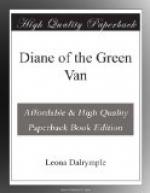With lightning-like grace Keela shot the arrows into the air and smiled.
“Great Scott!” exclaimed Philip admiringly. “Seven!”
With deft fingers she strung the bow again and shot, her cheeks as vivid as a wild flower, her poise and skill faultless.
“Eight!” said Philip incredulously. “Help!”
“Keela is easily the best shot I ever knew,” exclaimed Diane warmly. “Try it, Philip.”
“Not much!” said Philip feelingly. “I can shoot like a normal being with one pair of arms, but I can’t string space with arrows like that. You forest nymphs,” he added with mild resentment, “with woodland eyes and ears and skill put me to shame. You and I, Diane, quarreled once, I think, about the number of Pleiades—”
“They’re an excellent test of eyesight,” nodded Diane. “And you said there were only six!”
“There is no seventh Pleiad!” said Philip with stubborn decision.
“Eight!” said Keela shyly. And they both stared. Shooting a final arrow, she sent it so far that Philip indignantly refused to look for it.
CHAPTER XXXIII
BY THE WINDING CREEK
At dawn one morning a long black car shot out from Jacksonville and took to the open road. It glided swiftly past arid stretches of pine barrens streaked with stagnant water, past bogs aglow with iris, through quaint little cities smiling under the shelter of primeval oaks and on, stopping only long enough for the driver to ask a question of a negro on a load of wood—or a mammy singing plaintively in the flower-bright dooryard of a house.
Sometimes losing, sometimes finding, the trail of a green and white van, the long black car shot on, through roads of pleasant windings flanked by forest and river, beyond which lay the line of green-fringed sand hills which parallel the rolling Atlantic. Past placid lakes skimmed by purple martins, past orange groves heavy with fruit, past fences overrun with Cherokee roses, and on, but the driver, abroad with the sunrise glow, seemed somehow to see little or none of it. Sometimes he stared sombrely at a ghostly palmetto, tall and dark against the sky. Once with a grinding shudder of brakes he halted on the border of a cypress swamp and stared frowningly at the dark, dank trees knee-deep in stagnant water above which the buzzards flew, as if the loathsome spot matched his mood. As indeed it did.
For the words of Themar had done cruel work. Torn by black suspicion, Ronador saw no peace in this tranquil Florida world of sun and flower, of warm south wind and bright-winged bird. He saw only the buzzards, birds of evil omen. Swayed by fiery gusts of passion, of remorse, of sullenness and jealousy, he rode on, a prey to sinister resolution. To confront Diane with his knowledge of those days by the river, this resolution alternated as frequently with another—to put his fate to the test




